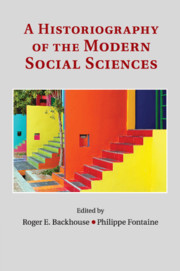Crossref Citations
This Book has been
cited by the following publications. This list is generated based on data provided by Crossref.
Fontaine, Philippe
2015.
Introduction: The Social Sciences in a Cross‐Disciplinary Age.
Journal of the History of the Behavioral Sciences,
Vol. 51,
Issue. 1,
p.
1.
Weintraub, E. Roy
2015.
Paul Samuelson's Historiography: More Wag than Whig.
SSRN Electronic Journal,
2015.
Other Books Received.
The American Historical Review,
Vol. 120,
Issue. 4,
p.
1592.
Weintraub, E. Roy
2015.
Paul Samuelson's Historiography: More Wag Than Whig.
SSRN Electronic Journal ,
Hale, Matthew
Raymond, Graham
and
Wright, Catherine
2015.
List of publications on the economic and social history ofGreatBritain andIreland published in 2014.
The Economic History Review,
Vol. 68,
Issue. 4,
p.
1388.
2015.
Publications Received.
Contemporary Sociology: A Journal of Reviews,
Vol. 44,
Issue. 3,
p.
442.
Weintraub, E. Roy
2016.
Game Theory and Cold War Rationality: A Review Essay.
SSRN Electronic Journal,
Csaba, László
2018.
Az intézményi gazdaságtan és a főáram.
Közgazdasági Szemle,
Vol. 65,
Issue. 01,
p.
1.
Waisbord, Silvio
2018.
Truth is What Happens to News.
Journalism Studies,
Vol. 19,
Issue. 13,
p.
1866.
Catherine, Herfeld
and
Doehne, Malte
2018.
Five reasons for the use of network analysis in the history of economics.
Journal of Economic Methodology,
Vol. 25,
Issue. 4,
p.
311.
Giraud, Yann
2019.
Five Decades of HOPE.
History of Political Economy,
Vol. 51,
Issue. 4,
p.
601.
Koch, Christian
Paavola, Sami
and
Buhl, Henrik
2019.
Social science and construction – an uneasy and underused relation.
Construction Management and Economics,
Vol. 37,
Issue. 6,
p.
309.
Backhouse, Roger E
and
Forder, James
2020.
Recent developments in the history of economics.
Oxford Economic Papers,
Vol. 72,
Issue. 4,
p.
915.
Maltsev, A. A.
2020.
Whither history of economic thought: A perspective from Russian and international scholars.
Voprosy Ekonomiki,
p.
94.
Moreno García, Juan Carlos
2021.
Egyptology and Global History: Between Geocultural Power and the Crisis of Humanities.
Journal of Egyptian History,
Vol. 13,
Issue. 1-2,
p.
29.
Bögenhold, Dieter
2021.
Neglected Links in Economics and Society.
p.
115.
van Eekelen, Bregje F.
2022.
Traveling Concepts: Anthropological Engagements with Histories of Social Science.
Annual Review of Anthropology,
Vol. 51,
Issue. 1,
p.
251.
Chen, Victor Zitian
and
Cantwell, John A.
2022.
An Evolutionary View of Institutional Complexity.
SSRN Electronic Journal ,
Thobane, Mahlogonolo S.
and
Jansen van Rensburg, Shandre Kim
2022.
Handbook of Research on Mixed Methods Research in Information Science.
p.
190.
Good, James M. M.
2022.
The Palgrave Handbook of the History of Human Sciences.
p.
1005.



